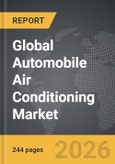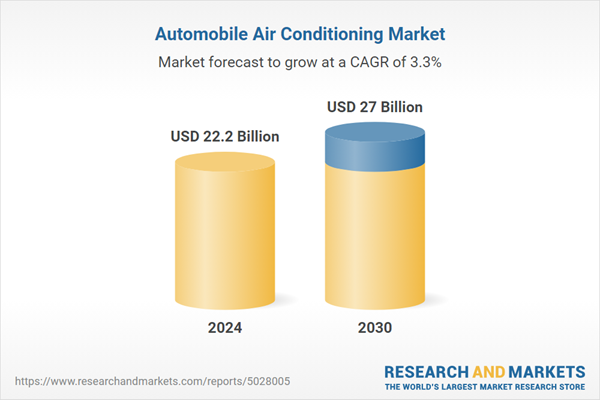Global Automobile Air Conditioning Market - Key Trends and Drivers Summarized
How Has Automobile Air Conditioning Evolved Over the Years?
Automobile air conditioning systems have come a long way since their inception, evolving from a luxury feature to a standard component in vehicles across the globe. Initially introduced in the 1940s, these systems were bulky, expensive, and available only in high-end cars. However, as technology advanced, air conditioning became more compact, efficient, and affordable, making it accessible to a broader range of consumers. Today's automobile air conditioning systems are highly sophisticated, designed to deliver optimal comfort regardless of external weather conditions. They incorporate advanced features such as automatic climate control, which allows drivers and passengers to set and maintain their preferred temperature without manual adjustments. The systems now use environmentally friendly refrigerants, replacing older, ozone-depleting substances, in compliance with global environmental regulations. Moreover, modern air conditioning units are designed to work seamlessly with other vehicle systems, including the engine and electrical systems, ensuring minimal impact on fuel efficiency and overall vehicle performance.Why Is Automobile Air Conditioning Considered Essential in Modern Vehicles?
In the contemporary automotive landscape, air conditioning is not merely a comfort feature but a necessity, especially in regions with extreme weather conditions. The ability to regulate the interior temperature of a vehicle directly impacts the driving experience, safety, and overall well-being of passengers. In hot climates, air conditioning helps prevent heat-related discomfort and health issues such as heat exhaustion, while in cold climates, it plays a crucial role in defogging windows, thereby improving visibility and driving safety. The widespread demand for air-conditioned vehicles has led to significant advancements in the design and efficiency of these systems. Automakers are increasingly focusing on integrating air conditioning systems that are not only effective but also energy-efficient, addressing concerns about fuel consumption and environmental impact. Additionally, with the rise of electric vehicles (EVs), there has been a shift towards developing air conditioning systems that operate efficiently without draining the vehicle's battery, a critical consideration for maintaining the range of EVs.What Are the Technological Innovations in Automobile Air Conditioning?
The field of automobile air conditioning is witnessing rapid technological advancements aimed at enhancing performance, energy efficiency, and environmental sustainability. One of the most notable trends is the development of dual-zone and multi-zone climate control systems, which allow different areas of the vehicle to be cooled or heated independently, catering to the individual comfort preferences of passengers. Another significant innovation is the introduction of air conditioning systems that use CO2 (R744) as a refrigerant, offering a more sustainable alternative to traditional refrigerants while delivering superior cooling performance. Furthermore, the integration of smart sensors and AI-driven systems is revolutionizing how air conditioning units operate, allowing for automatic adjustments based on real-time data such as cabin temperature, humidity levels, and the number of occupants. These systems can also be controlled remotely via smartphone apps, adding a layer of convenience for users. The adoption of lightweight materials and advanced compressor technologies is also contributing to the reduction of system weight and energy consumption, which is particularly important in electric vehicles where efficiency is paramount.What Is Driving the Growth of the Automobile Air Conditioning Market?
The growth in the automobile air conditioning market is driven by several factors, including the increasing demand for vehicles equipped with advanced comfort features, particularly in emerging markets where rising disposable incomes are enabling more consumers to afford air-conditioned vehicles. The rapid expansion of the electric vehicle market is another significant driver, as manufacturers seek to develop energy-efficient air conditioning systems that do not compromise the battery range of these vehicles. Technological advancements, such as the development of eco-friendly refrigerants and smart climate control systems, are also propelling market growth by aligning with global environmental regulations and consumer preferences for sustainable products. Additionally, the trend towards luxury and customization in the automotive industry is fueling demand for high-end air conditioning systems that offer personalized comfort and enhanced user control. As urbanization continues to rise and more people spend significant time in their vehicles, the importance of a comfortable and controlled cabin environment is expected to sustain the growth trajectory of the automobile air conditioning market.Report Scope
The report analyzes the Automobile Air Conditioning market, presented in terms of market value (USD). The analysis covers the key segments and geographic regions outlined below.- Segments: Technology (Automatic AC, Semi-Automatic AC); End-Use (Passenger Cars, Light Commercial Vehicles, Heavy Commercial Vehicles).
- Geographic Regions/Countries: World; United States; Canada; Japan; China; Europe (France; Germany; Italy; United Kingdom; Spain; Russia; and Rest of Europe); Asia-Pacific (Australia; India; South Korea; and Rest of Asia-Pacific); Latin America (Argentina; Brazil; Mexico; and Rest of Latin America); Middle East (Iran; Israel; Saudi Arabia; United Arab Emirates; and Rest of Middle East); and Africa.
Key Insights:
- Market Growth: Understand the significant growth trajectory of the Automatic AC segment, which is expected to reach US$18.1 Billion by 2030 with a CAGR of 3.6%. The Semi-Automatic AC segment is also set to grow at 2.8% CAGR over the analysis period.
- Regional Analysis: Gain insights into the U.S. market, valued at $5.9 Billion in 2024, and China, forecasted to grow at an impressive 5.1% CAGR to reach $5.5 Billion by 2030. Discover growth trends in other key regions, including Japan, Canada, Germany, and the Asia-Pacific.
Why You Should Buy This Report:
- Detailed Market Analysis: Access a thorough analysis of the Global Automobile Air Conditioning Market, covering all major geographic regions and market segments.
- Competitive Insights: Get an overview of the competitive landscape, including the market presence of major players across different geographies.
- Future Trends and Drivers: Understand the key trends and drivers shaping the future of the Global Automobile Air Conditioning Market.
- Actionable Insights: Benefit from actionable insights that can help you identify new revenue opportunities and make strategic business decisions.
Key Questions Answered:
- How is the Global Automobile Air Conditioning Market expected to evolve by 2030?
- What are the main drivers and restraints affecting the market?
- Which market segments will grow the most over the forecast period?
- How will market shares for different regions and segments change by 2030?
- Who are the leading players in the market, and what are their prospects?
Report Features:
- Comprehensive Market Data: Independent analysis of annual sales and market forecasts in US$ Million from 2024 to 2030.
- In-Depth Regional Analysis: Detailed insights into key markets, including the U.S., China, Japan, Canada, Europe, Asia-Pacific, Latin America, Middle East, and Africa.
- Company Profiles: Coverage of players such as Aptiv PLC, Calsonic Kansei Corporation, Denso Corporation, Eberspacher Climate Control Systems GmbH & Co. KG, Hanon Systems and more.
- Complimentary Updates: Receive free report updates for one year to keep you informed of the latest market developments.
Some of the 42 companies featured in this Automobile Air Conditioning market report include:
- Aptiv PLC
- Calsonic Kansei Corporation
- Denso Corporation
- Eberspacher Climate Control Systems GmbH & Co. KG
- Hanon Systems
- Keihin Corporation
- MAHLE GmbH
- Mitsubishi Heavy Industries Ltd.
- Sanden Holdings Corporation
- Trans/Air Manufacturing Corporation
This edition integrates the latest global trade and economic shifts into comprehensive market analysis. Key updates include:
- Tariff and Trade Impact: Insights into global tariff negotiations across 180+ countries, with analysis of supply chain turbulence, sourcing disruptions, and geographic realignment. Special focus on 2025 as a pivotal year for trade tensions, including updated perspectives on the Trump-era tariffs.
- Adjusted Forecasts and Analytics: Revised global and regional market forecasts through 2030, incorporating tariff effects, economic uncertainty, and structural changes in globalization. Includes historical analysis from 2015 to 2023.
- Strategic Market Dynamics: Evaluation of revised market prospects, regional outlooks, and key economic indicators such as population and urbanization trends.
- Innovation & Technology Trends: Latest developments in product and process innovation, emerging technologies, and key industry drivers shaping the competitive landscape.
- Competitive Intelligence: Updated global market share estimates for 2025, competitive positioning of major players (Strong/Active/Niche/Trivial), and refined focus on leading global brands and core players.
- Expert Insight & Commentary: Strategic analysis from economists, trade experts, and domain specialists to contextualize market shifts and identify emerging opportunities.
Table of Contents
Companies Mentioned (Partial List)
A selection of companies mentioned in this report includes, but is not limited to:
- Aptiv PLC
- Calsonic Kansei Corporation
- Denso Corporation
- Eberspacher Climate Control Systems GmbH & Co. KG
- Hanon Systems
- Keihin Corporation
- MAHLE GmbH
- Mitsubishi Heavy Industries Ltd.
- Sanden Holdings Corporation
- Trans/Air Manufacturing Corporation
Table Information
| Report Attribute | Details |
|---|---|
| No. of Pages | 244 |
| Published | January 2026 |
| Forecast Period | 2024 - 2030 |
| Estimated Market Value ( USD | $ 22.2 Billion |
| Forecasted Market Value ( USD | $ 27 Billion |
| Compound Annual Growth Rate | 3.3% |
| Regions Covered | Global |









